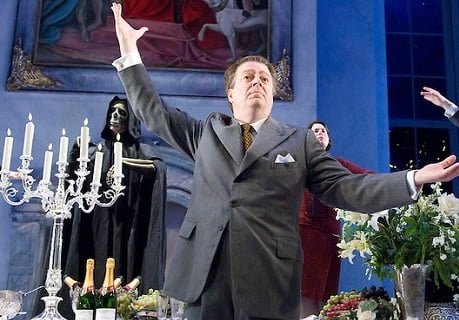Michael Frayn's portrait of Max Reinhardt dismays
“The guests are milling hopelessly around. They haven’t been directed.”
Max Reinhardt
Michael Frayn’s literary works are nothing if not accomplished. His latest play Afterlife focuses on the biography of the colourful and extravagant German theatre and film director Max Reinhardt and intersperses scenes from Reinhardt’s life with verses from the medieval morality play Everyman.
In Everyman God feels that humans have become too materialistic and sends his messenger Death to summon Everyman to journey to Heaven for judgment. Everyman tries to recruit other characters to accompany him most of whom refuse. Eventually Everyman finds a companion (Good Deeds) and after repenting of his sins enters Heaven accompanied only by his good deeds.
Everyman is performed every year in Salzburg at the festival in a tradition commenced by Max Reinhardt. Throughout Frayn’s play, anyone about to die hears the figure of Death calling “Everyman, Everyman” as a precognition of one’s own death.
The play opens with Reinhardt’s grand design in Salzburg with a magnificent cathedral set, three arches, huge columns, steps, architectural grandeur and the sound of trumpets. With his curly wig Roger Allam, looks not unlike the photographs of the young Reinhardt. As Reinhardt explains his grand design but emphasising the simplicity of the production, he says that his dream will have the sound effects of the real cathedral bells, the noise of real traffic, the afternoon light and, as he describes these, we hear and see them as if he is already controlling these external effects.
Reinhardt’s assistant is the efficient and long suffering Gusti Adler (Selina Griffiths) and Rudolf “Katie” Kommer (Peter Forbes) is his business manager. Helene Thimig (Abigail Cruttenden) is an actress and Reinhardt’s mistress, later to be his wife. “Katie” ’s job is to keep control of the finances and there is an amusing argument between them over the twenty whores that Reinhardt demands for the production. “I don’t want 200 whores, I am trying to purge the theatre of excess.” says Reinhardt. His famous excesses are described as he goes on world tours and sends back cables and telegrams ordering more and more. It is said that Reinhardt is filling the house with unpaid bills. His Salzburg house, Leopoldskron is a baroque palace on which he and Helene lavish time and money.
Much of the overly long first act is setting up for the second but clever as Frayn is, the play lacks intimacy and somehow fails to connect. Maybe it is to do with the obscurity of the references to Everyman the miracle play?
The sets are magnificent and grandiose but their very scale serves to distance the people who inhabit this baroque world from the audience and so we lose identification and empathy. Even in Los Angeles I was fascinated but distracted to see that the wall paper matched the chair and Max’s dressing gown. Again the cleverness of the juxtaposition of the Everyman lines with Reinhardt’s own life is one which strikes me as an example of the crossword compiler getting more fun out of the crossword that the solver.
Maybe Frayn’s play is meant to be studied rather than merely viewed? The first act ends with a choreographed and comedic waiting at table team of servants, who pose and bend their knees in choreographed synchronicity, in a much enjoyed lighter moment.
The second act has the Anschluss and the Nazis arriving in Austria. A bomb explodes and damages Max’s house, Leopoldskron, and he and his wife take refuge in the United States in very reduced circumstances. Much of this final act is interspersed with Frayn’s verses but written in the Everyman style, erudite but peculiar.
There are small details to enjoy. A character we meet in the first scenes in Salzburg called the Poor Neighbour, Müller (David Schofield) rises to power with the Nazis, welcomes the Anschluss and becomes the officer in charge. It is Müller who bans the performance of Reinhardt’s Everyman under the new regime. In a poignant moment, needing the money for a party and ever broke, Max asks his valet to get his dinner suit out of the dry cleaners. When the valet asks how he shall pay the cleaners, Max says to take it out of his wages. “What wages?” is the valet’s reply.
Afterlife sees fine performances, especially from Roger Allam as Max Reinhardt. Sadly the play itself is as much esoteric endurance as enjoyment.
Production Notes
Afterlife
Written by Michael Frayn
Directed by Michael Blakemore
Cast
Starring:
Roger Allam
With:
Abigail Cruttenden
Selina Griffiths
Peter Forbes
Glyn Grain
David Burke
David Schofield
Nicholas Lumley
David Baron
Colin Haigh
Sarah Head
Elizabeth Marsh
Charlotte Melia
Hugh Osborne
Peter Prentice
Claire Winsper
Rupert Young
Creatives
Director: Michael Blakemore
Set Designer: Peter Davison
Lighting Designer: Neil Austin
Music and Sound Designer: Paul Charlier
Costume Designer: Sue Wilmington
nationaltheatre.org.ukChoreographer: Francesca Jaynes
Information
Running Time: Two hours 25 minutes with one interval
Closed at the Lyttelton on 14th August 2008
Address:
The Lyttelton
National Theatre
South Bank
London SE1 9PX
Phone: 020 7452 3000
Website: National Theatre
Rail/Tube: Waterloo
Reviewed by Lizzie Loveridge at the Lyttelton
on 25th June 2008


